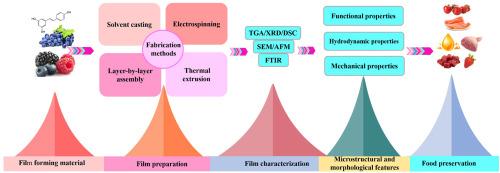白藜芦醇生物聚合物材料:一种可持续的食品包装方法
IF 15.1
1区 农林科学
Q1 FOOD SCIENCE & TECHNOLOGY
引用次数: 0
摘要
背景在生产可降解和生物聚合物食品包装薄膜的过程中,利用环保成分和技术的做法正日益受到重视。为提高这些薄膜的性能,可对生物聚合物分子进行改性,并加入纳米材料、交联剂、生物活性化合物和其他聚合物等添加剂。白藜芦醇是一种天然多酚化合物,通常存在于葡萄、浆果和其他植物的表皮中,因其独特的性质和在制造食品包装用生物可降解聚合物方面的潜在应用而备受关注。白藜芦醇无毒且被公认为安全(GRAS),可随意添加到包装材料中。不过,一些研究建议使用封装系统来控制白藜芦醇的释放。白藜芦醇具有很强的抗菌性和抗氧化性,因此很有希望成为旨在延长保质期和保持食品新鲜度的活性智能聚合物包装系统的候选材料。此外,它还能改善包装的物理和机械性能,如阻隔性能、耐水性、含水量、拉伸强度、疏水性和热稳定性。然而,要优化白藜芦醇在包装材料中的性能,还需要仔细考虑其有限的水溶性和热不稳定性带来的挑战。它深入探讨了各种配方方法、加工技术以及如何利用白藜芦醇来提高食品包装的功效。此外,论文还探讨了未来潜在的研究策略,以最大限度地发挥白藜芦醇在提高食品包装的可持续性和质量方面的潜在优势。本文章由计算机程序翻译,如有差异,请以英文原文为准。

Resveratrol-biopolymer materials: A sustainable approach to food packaging
Background
The utilization of eco-friendly ingredients and techniques in the production of degradable and biopolymeric food packaging films is gaining traction. To enhance the performance of these films, biopolymer molecules can undergo modification, and additives such as nanomaterials, crosslinkers, bioactive compounds, and other polymers can be incorporated. Resveratrol, a natural polyphenolic compound commonly found in the skin of grapes, berries, and other plants, has attracted much attention due to its unique properties and its potential applications in creating biodegradable polymers for food packaging.
Scope and approach
The review investigates the potential of resveratrol in improving the quality and safety of packaged food products. Resveratrol, being non-toxic and Generally Recognized as Safe (GRAS), can be freely added to packaging materials. However, some studies suggest using encapsulation systems to control its release. Resveratrol has strong antimicrobial and antioxidant properties, making it a promising candidate for active and intelligent polymer packaging systems designed to extend shelf life and maintain food freshness. Additionally, it improves the physical and mechanical properties of packaging, such as barrier performance, water resistance, moisture content, tensile strength, hydrophobicity, and thermal stability. Nevertheless, challenges related to its limited water solubility and thermal instability require careful consideration to optimize its performance in packaging materials.
Key findings and conclusions
This review paper investigates the recent advancements in the incorporation of resveratrol into packaging materials. It thoroughly explores various formulation methodologies, processing techniques, and the utilization of resveratrol to improve the efficacy of food packaging. Additionally, the review examines potential future research strategies geared towards maximizing the prospective advantages of resveratrol in bolstering the sustainability and quality of food packaging.
求助全文
通过发布文献求助,成功后即可免费获取论文全文。
去求助
来源期刊

Trends in Food Science & Technology
工程技术-食品科技
CiteScore
32.50
自引率
2.60%
发文量
322
审稿时长
37 days
期刊介绍:
Trends in Food Science & Technology is a prestigious international journal that specializes in peer-reviewed articles covering the latest advancements in technology, food science, and human nutrition. It serves as a bridge between specialized primary journals and general trade magazines, providing readable and scientifically rigorous reviews and commentaries on current research developments and their potential applications in the food industry.
Unlike traditional journals, Trends in Food Science & Technology does not publish original research papers. Instead, it focuses on critical and comprehensive reviews to offer valuable insights for professionals in the field. By bringing together cutting-edge research and industry applications, this journal plays a vital role in disseminating knowledge and facilitating advancements in the food science and technology sector.
 求助内容:
求助内容: 应助结果提醒方式:
应助结果提醒方式:


